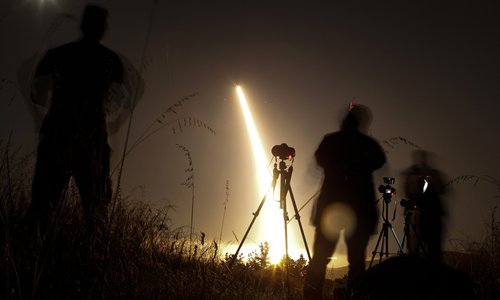As tension between China and the US is worsening due to the US’ hysterical overreaction in shooting down China’s unmanned civilian-use airship, the US military, politicians and media have moved on to hype another issue – that the so-called number of China’s intercontinental ballistic missile (ICBM) launchers has surpassed that of the US.
This makes the toxic atmosphere of a new cold war swell further, Chinese analysts said on Wednesday.
The US is using this unexpected incident as an excuse to justify its demands for an increase in the defense budget to expand its nuclear arsenal and upgrade its ICBM launching platforms like nuclear submarines, said military experts. The claim that China has built more ICBM launchers than the US is speculation based on exaggeration and the “China threat theory,” said analysts.
More importantly, the US has more nuclear warheads than China does, and it is unreasonable and unfair for the US to use China’s nuclear buildup to justify its own hegemonic nuclear ambition that could break the nuclear balance between major powers and threated world peace, experts said.
The US military has notified the Congress that China now has more land-based intercontinental-range missile launchers than the US, “fueling the debate about how the US should respond to China’s nuclear buildup,” said a report by the Wall Street Journal on Tuesday.
“The number of land-based fixed and mobile ICBM launchers in China exceeds the number of ICBM launchers in the United States,” General Anthony Cotton, commander of the US Strategic Command, which oversees nuclear forces, wrote in a letter to the Armed Services Committees of the Senate and the House on January 26.
A joint statement released on Tuesday by Republican leaders of Congress’ Armed Services committees called the letter “a wake-up call for the United States,” CNN reported on Tuesday.
CNN reported that “ICBMs are a staple in the US nuclear triad, which includes nuclear delivery systems on land and in the air and sea.” According to the US Defense Department, they are distributed across 400 “hardened, underground silos” with another 50 silos “kept in ‘warm’ status.” The US arsenal also includes more than a dozen submarines capable of launching ballistic missiles and a fleet of nuclear-capable bombers.
Song Zhongping, a military expert and TV commentator, told the Global Times on Wednesday that “according to the data from the US Department of Defense, the US has at least 450 silos, which is a huge number, and if the US military claimed that the number of China’s land-based fixed and mobile ICBM launchers is larger than 450, then this could be a completely exaggerated speculation. US military officers were just hyping the ‘China threat theory’ again.”
Wei Dongxu, a Beijing-based military expert, told the Global Times on Wednesday that “the US military and politicians are using trickery to fool the US public. The US’ strategic nuclear capabilities mainly consist of sea-based and air-based launch platforms, so when they compare land-based launchers in the US and China, they are just finding excuses to support their China threat theory for their own greedy purposes.”
The purpose of the US military is simple – to justify its budgetary demands to expand the US’ nuclear arsenal and build more weapons for nuclear war, Song said. “They want to use Columbia-class nuclear submarines to replace the Ohio-class submarine, and also want more new B21 strategic bombers to replace the old B2, B1, B1B and B52 bombers. They are also developing the LGM-35 Sentinel ICBM system,” Song said.
Even if China has built more ICBM launchers than in the past, it is legitimate and reasonable, because the increasing strategic pressures and threats imposed by the US and its allies around China have forced China to spend more resources to strengthen its nuclear deterrent and second strike capability, said a Beijing-based military expert who asked for anonymity.
“China needs a powerful and convincing nuclear deterrent to make sure those hegemonic forces and their followers dare not offend and harm China’s national security, sovereignty, and the right of development,” he told the Global Times on Wednesday.
(Global Times)




